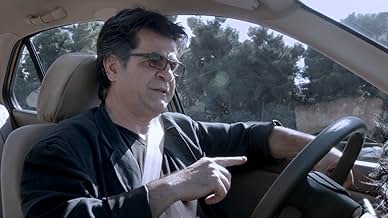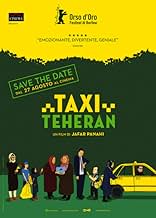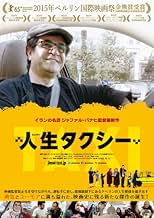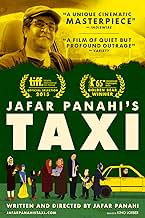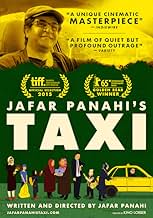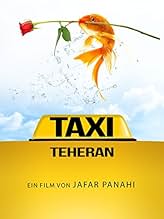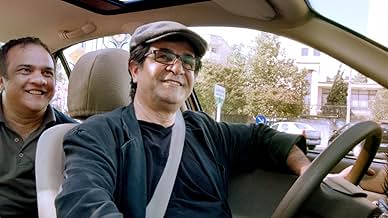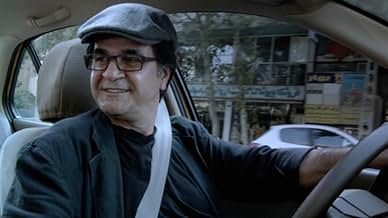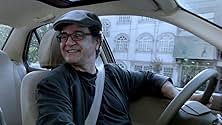Le gouvernement iranien ayant interdit à Jafar Panahi de tourner des films, il se fait passer pour un chauffeur de taxi et réalise un documentaire sur les enjeux sociétaux en Iran.Le gouvernement iranien ayant interdit à Jafar Panahi de tourner des films, il se fait passer pour un chauffeur de taxi et réalise un documentaire sur les enjeux sociétaux en Iran.Le gouvernement iranien ayant interdit à Jafar Panahi de tourner des films, il se fait passer pour un chauffeur de taxi et réalise un documentaire sur les enjeux sociétaux en Iran.
- Récompenses
- 8 victoires et 8 nominations au total
Avis à la une
Filmed via a number of small cameras, some fixed within the taxi itself, some carried around by other protagonists, the story sees Panahi acting as a cab driver and encountering pieces of the Iranian Weltanschauung. The irony of his position is highlighted as his first passenger criticizes his geographical orientation, noticing that something must have gone seriously wrong for Panahi in order for him to have to resort to something he has no clue about. And after a short argument between passengers about whether stealing the wheels off a car should warrant the death penalty or not, "just to send a message", you get the sense of how easily people become desensitized to such matters if only they are faced with them frequently enough. Paradoxically, the man suggesting this course of action is a "freelancer" himself, but more of a Robin Hood mold, which apparently should exempt him from a similar punishment.
This contradiction between wrong and right is explored throughout the journey, as Panahi encounters a series of colourful characters: a man selling pirated international films (who actually recognizes the director and takes quick advantage of him), a woman weeping over her dying husband, two older women fighting for their lives, an old neighbour who had recently been the victim of a robbery, a woman suffering a similar fate of marginalization due to the her political views, and Panahi's niece, who is just being introduced to what "publishable films" are in Iran.
Panahi strikes a fine balance between some more comical aspects of Iranian life and the very dire need for self expression, that is severely limited. The humanism that pervades Taxi poses the same question repeatedly: what causes crime and who is a criminal within Iranian society? Drawing from a well of personal experience, he manages to create an endearing context for all his protagonists and their tales and it feels like he is taking us by the hand and guiding us, not so much physically, as emotionally. His smile spreads these emotional cues, from affection to sympathy, confusion and intense discomfort, and this gives off the sensation of being joined by a friend throughout this journey.
The worst that can be said is that the scripting of events does occasionally feel a bit heavy handed, in order to condense all the experience in what is ultimately a very short film. And while generally avoiding the lure of leaning too heavily on caricature, it ends on a slightly underwhelming artistic note.
But those are all the complaints I have to make. I very much enjoyed Taxi and gathering from the vibe around me, so did many of the other people watching it. While I feel the focus should generally be on the art, more than on the artist, here's hoping that Panahi will have the chance to one day echo the affection he receives and generates in festival venues around the world, by having the freedom to openly appear alongside Iranian artists and their uncensored visions.
The premise of Taxi is simple - Panahi himself, with cameras cleverly affixed throughout his vehicle, drives a taxi through the teeming streets of Iran. Throughout the day, Panahi the cabbie picks up strangers, friends and relatives, played by themselves or non- professional actors. Along the way, he makes idle conversation with them, or they chat amongst themselves - ordinary chatter that carries quite extraordinary import.
It's fascinating, thought-provoking stuff, delving deeply into ideas and questions about Iran and its politics while firmly couched in the language of the everyday. Two passengers launch into an impassioned discussion on the merits (or lack thereof) of capital punishment and syariah law. The broken body of a man is bundled into the backseat and, with what he thinks is his dying breath, he tries to circumvent laws that will prevent his sobbing wife from inheriting their home. Art and ideas are sold on the streets, the stuff of covert piracy, as the precocious Hana Saeidi, Panahi's young niece, relates to him the lessons she has learnt on how exactly to make films that will be 'screenable' in Iran.
To be honest, the final film is an amiable if somewhat rickety affair. Parts of it work better as metaphors, faltering somewhat in the execution. For instance, Hana is, literally and metaphorically, the future - both of Iran and, with her own little hand-held camera, filmmaking. But the moment when she tries to exert control over a scene she's shooting from the window of the taxi, haranguing a little boy to behave differently so that her footage will pass muster in school, feels a little too on-the-nose. In a couple of instances, it's easy to identify the issues Panahi wants to raise: in a bowl of fish or an iPad video, he finds insights about the power of superstition and the tragedy of poverty. But the scenes themselves don't always work as well, ambling when they should sprint.
Nevertheless, it's impossible to remain unmoved by the quiet power and heartbreaking passion of Taxi. This is a gem of a film: subtle, leisurely and surprisingly funny; thoughtful and deep but rarely overbearingly so. It's all the more impressive, of course, as a testament to Panahi's ongoing refusal to bend and break beneath the 20-year filmmaking ban that was slapped on him in December 2010. Since then, he's smuggled a film out of Iran on a flash drive baked into a cake, and assembled Taxi out of cam footage shot in broad daylight in Tehran. That's why, in ways both big and small, Taxi serves as a bold reminder of the bravery and strength of the human spirit.
Read More Here (https://filmcurious.wordpress.com/2015/05/02/review-taxi- 2015/#more-145)
In Tehran Taxi, Panahi masquerades as a taxi driver and picks up a range of curious passengers throughout Tehran; from a couple of old ladies nursing a goldfish in a bowl, a mugger, a flower seller and a traffic accident victim.
It's an unusual style, but one made familiar by dash-cams across the world and both the subject matter and style of interlocking stories reminded me of Jim Jarmush's 1991 film 'Night on Earth'.
Panahi isn't a comedian, but his style is lighthearted. The fact he is a film maker rather than a real taxi driver also means that he doesn't know many directions around the city and he further bemuses passengers when he refuses to take payment at the end of the ride. Equally though film paints an interesting picture of the everyday lives of the passengers and the buzz of the city going on on the streets of Tehran outside of the taxi's window.
Tehran Taxi is an excellent film. Sit back and enjoy the ride!
Le saviez-vous
- AnecdotesShortly after the film's premiere at Berlin was announced, Jafar Panahi released an official statement in which he promised to continue making films despite the ban and said, "Nothing can prevent me from making films since when being pushed to the ultimate corners I connect with my inner-self and, in such private spaces, despite all limitations, the necessity to create becomes even more of an urge."
- Citations
Nasrin Sotoudeh: They work in a way that let us to know they are watching us.Their tactics are obvious.First, they write you up a police record. Suddenly, you are accused of being an agent for Mossad, The CIA, or MI6. Then they tack on something about your morals, your lifestyle. They make your life into a prison.Although you are released from prison, but the outside world is only a bigger prison.They make your nearest friends into your worst enemies.After that you think all you can do is either leave the country or pray to return to that hole. So i think it's better to let it go.
- ConnexionsReferenced in Film Junk Podcast: Episode 547: The Revenant and Best of 2015 (2016)
Meilleurs choix
- How long is Taxi?Alimenté par Alexa
Détails
Box-office
- Montant brut aux États-Unis et au Canada
- 321 642 $US
- Week-end de sortie aux États-Unis et au Canada
- 22 531 $US
- 4 oct. 2015
- Montant brut mondial
- 3 906 227 $US
- Durée1 heure 22 minutes
- Couleur
- Mixage
Contribuer à cette page



